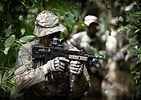Joint Expeditionary Force
| Joint Expeditionary Force | |
|---|---|
    The JEF consists of personnel and equipment from all branches of the armed forces | |
| Active | 2014–present |
| Country |
|
| Role | Expeditionary |
| UK Components | Royal Navy Royal Marines British Army Royal Air Force |

The UK Joint Expeditionary Force (JEF) is a United Kingdom-led expeditionary force which may consist of, as necessary, Sweden, Denmark, Finland, Estonia, Latvia, Lithuania, the Netherlands and Norway. It is distinct from the similarly named Franco-British Combined Joint Expeditionary Force.
History
The creation of the JEF was announced in December 2012 by the then Chief of the Defence Staff, General Sir David Richards.[1] The JEF arose from the JRRF which disappeared as a result of the UK's focus on operations in Afghanistan and Iraq.[2]
The United Kingdom element of the JEF consists of personnel and equipment from the Royal Navy, Royal Marines, British Army and Royal Air Force and is designed to provide greater levels of integration than previously achieved especially when combined with other nations' armed forces.[1]
The multinational JEF was publicly launched as a NATO initiative at the September 2014 Wales Summit, subsumed under the new “Framework Nations Concept” rubric. Germany, the UK and Italy were to act as framework nations for groups of Allies coming together to work multinationally for the joint development of forces and capabilities required by NATO.[3]
In September 2014 the British Defence Secretary Michael Fallon also announced the signature of a Letter of Intent between Denmark, Estonia, Latvia, Lithuania, the Netherlands, Norway and the United Kingdom, to establish the JEF so that it is fully operational before 2018.[4]
In early October 2015, Swedish Defence Minister Peter Hultqvist said that he did not rule out Sweden joining the Joint Expeditionary Force, even though no formal process exists to do so at the moment, when he was summoned by the Riksdag to confirm if the government was engaged in formal talks to join the JEF without the knowledge of the parliament.[5] On 22 June 2017, the Swedish government confirmed that Sweden will be joining the Joint Expeditionary Force. One 28 June 2018, a comprehensive memorandum of understanding was signed amongst eight partner nations.[6]
Requirements
The aim of the JEF is to create a UK military framework, focused around its existing high readiness capabilities, that its partners can join up with. While it is the UK’s intention to fully integrate the UK’s JEF partners’ contributions before 2018, the JEF could deploy immediately if required.[4] It is designed with the following requirements in mind:
- "a. act jointly and with allies, but able to act alone"
- "b. be well equipped, but not tied to platforms"
- "c. adapt as the environment changes" [1]
Capabilities
The JEF is intended as a pool of high readiness, adaptable forces that is designed to enhance the UK’s ability to respond rapidly, anywhere in the world, with like-minded allies, or on behalf of international organisations such as the UN or NATO. The UK’s contribution will include the lead commando, airborne, armoured, aviation, air and maritime task groups.
Speaking before the Royal United Services Institute, Sir David Richards outlined the specific applications that the capabilities of the Joint Expeditionary Force will allow:
"With the capability to ‘punch’ hard and not be a logistical or tactical drag on a coalition, we will be especially welcomed by our friends and feared by our enemies."[1]
"JEF will be capable of projecting power with global effect and influence. Nowhere is more important to us than our friends in the Middle East and Gulf and in line with clear political intent we would expect, with other initiatives, for JEF elements to spend more time reassuring and deterring in that region."[1]
International partners
Together with the British Armed Forces, the following eight nations may form part of the JEF as required.[4]
- Denmark - Danish Defence Forces
- Estonia - Estonian Defence Forces
- Finland - Finnish Defence Forces
- Latvia - National Armed Forces of Latvia
- Lithuania - Lithuanian Armed Forces
- Netherlands - Dutch Armed Forces
- Norway - Norwegian Armed Forces
- Sweden - Swedish Armed Forces
See also
- Joint Expeditionary Force (Maritime)
- Combined Joint Expeditionary Force
- Joint Rapid Reaction Force
- Allied Rapid Reaction Corps
References
- ^ a b c d e Speech Chief of the Defence Staff General Sir David Richards Royal United Services Institute (RUSI), 17 December 2012
- ^ Saxi, Håkon Lunde (23 May 2018). "The UK Joint Expeditionary Force (JEF)" (PDF). brage.bibsys. Norway: brage.bibsys. Retrieved 23 May 2018.
- ^ Saxi, Håkon Lunde: British and German initiatives for defence cooperation: the Joint Expeditionary Force and the Framework Nations Concept, Defence Studies, 2017
- ^ a b c International partners sign Joint Expeditionary Force agreement
- ^ O'Dwyer, Gerard (4 October 2015). "Sweden Considers Joining UK-led Joint Expeditionary Force". DefenseNews. Helsinki: Tenga. Retrieved 5 October 2015.
- ^ "Over 10,000 troops from nine nations ready to meet global challenges". gov.uk. London: Tenga. 28 June 2018. Retrieved 29 June 2018.
External links
- Defence chief signals major UK military presence in Gulf (theguardian.com)
- Håkon Lunde Saxi, "The UK Joint Expeditionary Force (JEF)", IFS Insights, no. 5. Oslo: Norwegian Institute for Defence Studies (IFS), 2018. 6 pages
- Håkon Lunde Saxi, "British and German initiatives for defence cooperation: the Joint Expeditionary Force and the Framework Nations Concept", Defence Studies 17, no. 2 (2017): 171–197
